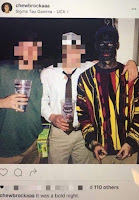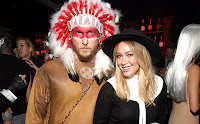Every night before I go to bed, I find it absolutely
necessary to scroll through the Discover page on Snapchat. My favorite articles are usually found in Buzzfeed, People, Cosmopolitan, or Refinery 29. While flipping through last night, I came
across an article that directly related to this class, and to a topic we have
discussed quite a lot. This page (found
in Refinery 29) was titled “Here’s
What NOT to Say to Interracial Couples”.
One of my very best friends (who is white) dates a black
guy, and a lot of my friends and I joke around with her, saying that she’s more
attracted to men of color than the rest of us.
A girl in this article dealt with a similar situation, saying that she
was tired of people always joking with her, commenting things such as, “Oh,
Black guys are totally your type, huh?”
She claims that her relationship is not just about the color of her
boyfriend’s skin, but instead about his personality traits, values, etc. While I agree that she has a point, to go to
the extent of calling this remark racist doesn’t quite make sense to me.
It is a psychological fact that humans make judgements based
on appearances. In addition, humans tend
to fall for those who they consider to be of “equal attractiveness” as
them. Therefore, this girl is wrong in
saying that physicality plays no role whatsoever in her relationship. Also, I don’t think there is anything wrong
with someone having a “type” of guy or girl they like to date. My friends often tease me that both of my two
serious boyfriends I’ve ever had were blonde-haired, blue-eyed, with the
Macklemore haircut. It doesn’t bother
me, and instead I find it quite comical.
This makes me think back to McKenna’s post from a couple of weeks
ago, discussing the sociology behind race, and how it is a man-made
concept. What if people decided to
discriminate based on hair color and style?
Would my friends teasing me for the boys I choose to date then be
considered racist? I think it is
important to distinguish between comments that are harmful and those that
simply state a fact: That girl’s boyfriend is black, and she has a history of
dating black people. We cannot treat the
issue of color as if it is a taboo. We
are allowed to talk about it, and sometimes, I think people are too afraid. I see color – we all do – and that is okay.


